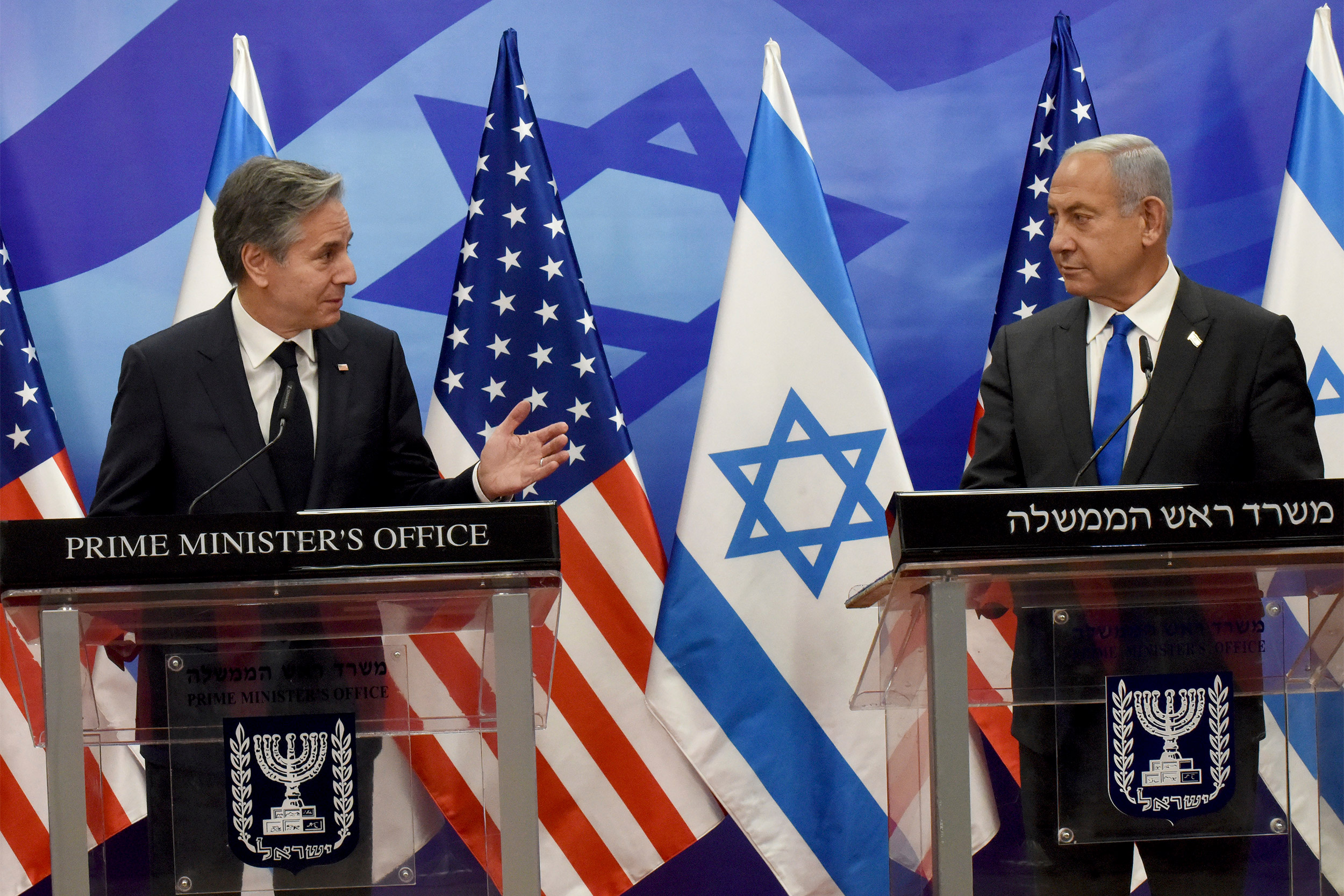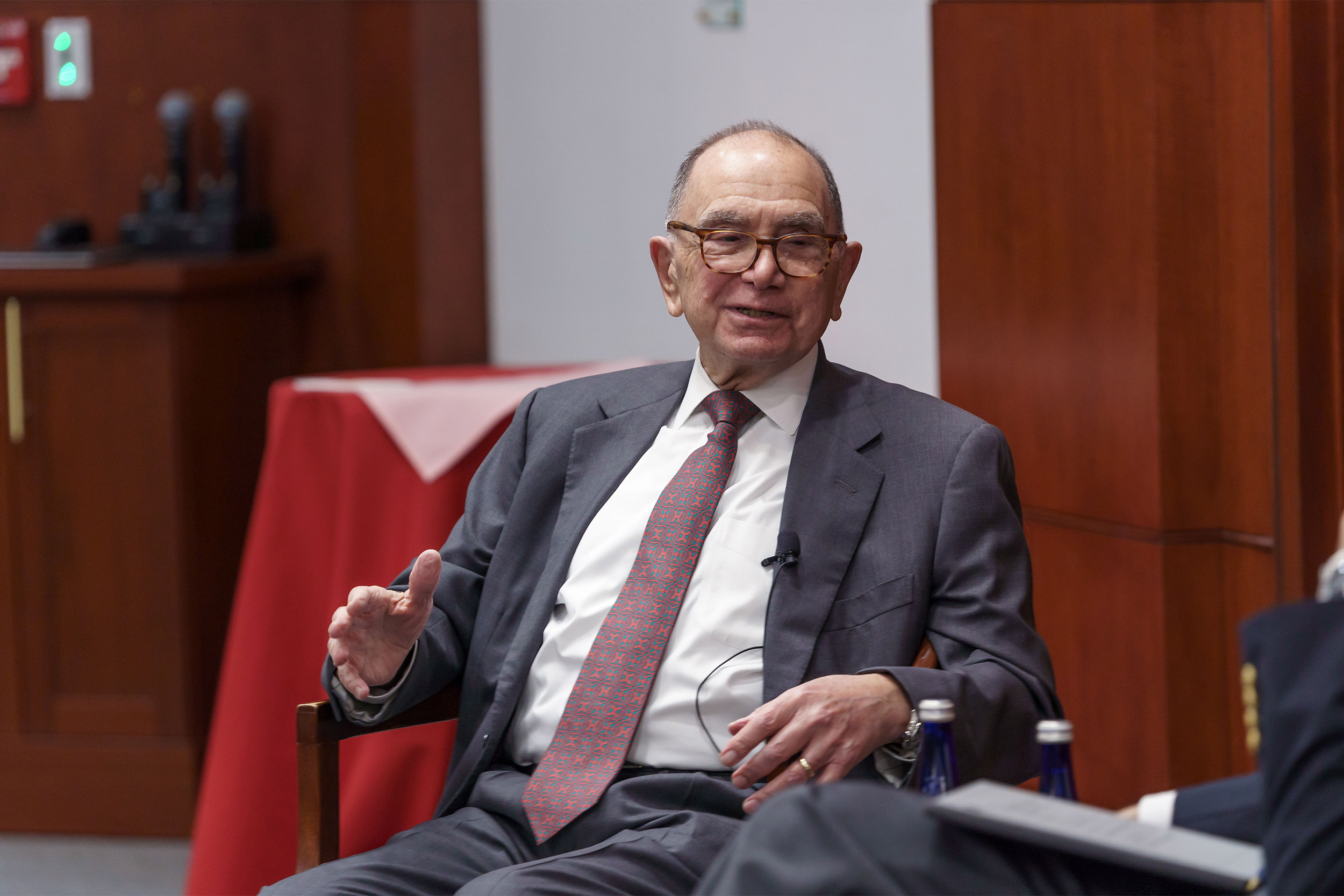
Secretary of State Anthony Blinken (left) and Israeli Prime Minister Benjamin Netanyahu met on Jan. 30 during Blinken’s two-day visit to the MIddle East.
Debbie Hill/Pool Photo via AP
Defining moment for longtime allies
As domestic, regional tensions test Israel-U.S. ties, former ambassador sees key role for Biden administration in buoying hope for Middle East peace
A procession of senior U.S. diplomats and officials, including Secretary of State Antony Blinken and CIA Director Bill Burns, has traveled to the Middle East, including Jerusalem, in the past few weeks in hopes of defusing recent violence between Israel and Palestine. Inside Israel, protesters continue to demonstrate against a plan by the far-right government of Prime Minister Benjamin Netanyahu, now in his sixth term, to weaken the nation’s judiciary power and independence.
To better understand what’s happening, the Gazette spoke with Edward P. Djerejian, a career Foreign Service officer who served as the U.S. ambassador to Israel and Syria and as assistant secretary of state for Near Eastern affairs during the Clinton, Bush I, and Reagan administrations before retiring to lead the Baker Institute for Public Policy at Rice University. Djerejian is currently a senior fellow at the Belfer Center’s Middle East Initiative at Harvard Kennedy School. The interview has been edited for clarity and length.
Q&A
Edward P. Djerejian
GAZETTE: The turmoil that has engulfed Israel since the recent election has alarmed people inside and outside the country. What has been happening?
DJEREJIAN: Israelis have elected the most right-wing coalition government in Israel’s history, headed by Netanyahu. This new government has initiated policies and proposals that, both on the domestic front and toward the Palestinians, have caused a great deal of internal debate and division in Israel and widespread public demonstrations. Externally and especially in Washington, major questions have arisen concerning the impact of the new government’s policies on Israel’s democratic system and the Palestinian issue.
GAZETTE: What are U.S. officials and other Middle East nations most worried about?
DJEREJIAN: One common concern is that neighboring countries and the United States do not have any interest in an escalation of violence in the occupied territories. Further exacerbation of the relationship between Israel and the Palestinian Authority, and with Hamas in Gaza, could culminate in regional instability. The Biden administration wants to avoid a flare-up of tensions in the Middle East, especially with the war in Ukraine and with other major domestic and foreign-policy issues it has to deal with, including China. So the first goal of the U.S. and some in the region is to manage the immediate crisis. The visits of high-level American officials are an exercise in conflict management, they are not an exercise in conflict resolution of the major problem — the occupation of the Palestinian territories and the intermittent violence and instability that stem from the status quo. Unfortunately, a peace agreement today is elusive for many reasons.
Another serious concern is the weakness of the Palestinian Authority. This is also an important factor in the equation. The president of the Palestinian Authority, Mahmoud Abbas, is of a certain age and faces political challenges from within Fatah and especially from Hamas and Palestinian Islamic Jihad. The Palestinian Authority’s security cooperation with Israel is under increasing critical scrutiny. And the promise of the 1993 Oslo Accords, which created the Palestinian Authority, to achieve forward movement toward a peace agreement with Israel has not been realized.
“The Biden administration wants to avoid a flare-up of tensions in the Middle East, especially with the war in Ukraine and with other major domestic and foreign-policy issues it has to deal with, including China,” says Edward P. Djerejian.
Credit: Liza Xiao/Belfer Center

GAZETTE: Biden and Netanyahu have a history that goes back to the early 1980s. Does that one-on-one relationship affect relations between the two longtime allies?
DJEREJIAN: The relationship between the president of the United States and the sitting prime minister of Israel can influence the direction of this very important U.S.-Israeli relationship, so it is important. But there are serious differences. Beyond the rhetoric, each country has its interests. One has to see how Netanyahu is going to define Israel’s interests as the head of this new coalition government. When Blinken said in his press conference that all sides have to take steps to prevent further escalation and violence, that the United States would oppose any moves that run counter to the efforts for a two-state solution, including settlement expansion, moves toward annexation, demolitions and evictions of Palestinians, and changes to the status quo of the holy places, what the United States is signaling to this new government is that the U.S. has interests in terms of the stability of the region and preventing further escalation.
GAZETTE: Are there prospects for the U.S. to influence Netanyahu on domestic and/or regional fronts given some of the disagreements between the two governments?
DJEREJIAN: The relationship is a strong one, with bipartisan support. We have multiple bilateral ties in various fields and major assistance programs. We just completed a joint military exercise that underscored the extent of close U.S.-Israeli military and security cooperation. We have influence, there’s no question about it. How we use it is another question.
GAZETTE: Meaning the U.S. might consider withholding support or protection as a bargaining chip?
DJEREJIAN: That would depend on the evolution of events. In 1992, the Bush administration linked $10 billion dollars of housing loan guarantees to Israel halting settlement activity. What is on the table for the moment is the political influence the United States can exert on both the Israelis and the Palestinians to define lines that should not be breached and prevent violence and the deterioration of the situation on the ground. The U.S. also has influence with neighboring countries, including Jordan, Saudi Arabia, the Gulf States, and Egypt. Right now, any structural resolution of the Palestinian issue is not on the horizon, so that’s why the focus is on crisis management and not crisis resolution. But if you look at the big picture, there is no realistic military or security solution to the Palestinian issue. Only a negotiated political solution will resolve the issue. In that context, I think it’s important for the United States to use its influence to get the parties to start refocusing specifically on a political horizon, even if it’s just conceptual, to give hope that there is some way out of this cycle of violence. Where there is no hope, worst-case scenarios will arise.




